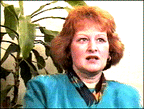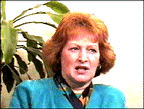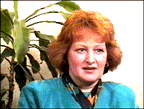![]() Listen
to Linda P. share a cancer experience in her own words. (624 K
.au file)
Listen
to Linda P. share a cancer experience in her own words. (624 K
.au file)

Linda was a single parent of twin teenage daughters when she was diagnosed with breast cancer. It was very important to her to be there for her children. Linda was also concerned about her ability to keep her job, to support her family, and maintain her health insurance.

Linda found her cancer through a routine mammogram. After her experience, her mother and sisters went in for their mammograms. Her younger sister found a lump and her biopsy showed the lump to be benign. Before Linda could start treatment, she had to find a doctor close to her work.

Because Linda had positive lymph nodes, chemotherapy was recommended. She joined a clinical trial that gave her an aggressive treatment. The chemotherapy was followed by radiation therapy.

Linda had to reach out to her family and friends for help in recovery. Her twin daughters, Jennifer and Jessica, both responded to Linda's cancer in different ways, but worked together to help the recovery process. Linda is still having some problems with lymphedema of her arm, and she is still back at work and going on with her life.
Linda's Introduction: My daughters felt anger
I was 42 years old when my cancer was discovered, and my twin
daughters were 15 at that time. And when we did talk to the cancer
specialist, I noticed a real strain of anger in my daughters' voices
because they couldn't imagine that there was all this research going
on, but yet there wasn't a cure for breast cancer. And I think that
they were recognizing not only my own mortality, but the possibility
that they would have to face this in their future as well.
Linda's Introduction: Keep track of your treatment
Some women will like to keep a journal because they want to
document their feelings. From the economics of breast cancer, I would
recommend that you keep a journal so that you keep track of what
procedures were done at those doctor's appointments. You're going to
find even if you have health insurance coverage, that once these
bills and these statements start coming in it gets very confusing,
especially if you have an extended treatment program and that it
lasts over a year. Make sure that you're documenting these things.
What I also found was that there were people in my support network
that were willing to help me and making sure that I was paying the
bills, or that the insurance company was paying the bills.
Linda's Introduction: You have to be assertive
I had come in contact with a radiologist who had been reviewing my
case from the onset, and now I was scheduled to begin radiation. I
found out on my first visit that he was not a doctor who participated
in my health insurance plan. Cost was a little bit of challenge
because I needed to go to this particular facility to get my
radiation treatments. It was close to my work, it was a doctor now
that I had become familiar with and trusted. I asked him if even
though he didn't participate in my insurance, if he would take the
amount of money that my insurance was willing to pay for this
treatment program, and he agreed to do that. We signed a contract.
And these are things that you have to be forward enough, or
aggressive enough to ask.
Linda's Introduction: I Chose To Be A Survivor
At the onset when you discover you have breast cancer, somewhere
in that time when you're waiting for those appointments, you have to
talk to yourself about whether or not you're choosing to be a
survivor or a victim. And every time you make a choice on who you
tell, how you tell them, what you read, how you handle cancer at
work, all these things are an indication in the reinforcement to
yourself that you're a survivor. And I wasn't thinking about that
when I was going through it, but when I reflect back - those are all
choices to be a survivor. Fortunately for me, my daughters made me
all the more determined to be a survivor. I wanted to be here for
their graduation, for their weddings. I want to be here. Everybody
has to have something in their life worth living for. We don't just
live for ourselves. I'm having chemotherapy not because my best
friend is telling me go do it, or my husband is telling me go do it.
I'm doing it for myself because I'm choosing life and I'm choosing to
be a survivor. Women are not dying of breast cancer any more. Women
are living with breast cancer.
Linda's Introduction: The economics of breast cancer
This is what I refer to as the economics of breast cancer. Cancer
treatment can be very expensive without health insurance, or if
you're electing options and are not covered by your health insurance.
If it's not going to cover those expenses, what kind of arrangements
can you make with the doctors or with other treatment facilities.
Perhaps you can get some kind of subsidy to cover the cost of those
treatments. At the work site, you also have to make a determination
of whether or not there is any leave time available to you. Do they
have to give you time off? Do they have to accommodate your treatment
schedule? These are all very legitimate questions. A lot of the
answers can come from your employer. A lot of them you may have to
call the Department of Labor, or you may have to call the American
Cancer Society, but there are answers to all these questions out
there and its important that you get them. And its important that you
go through this information and process it in an objective manner.
And if you can't do that, then get some help. When you are going
through cancer treatment, you do not need the stress of more
financial complications. You need to be able to concentrate on the
treatment itself.
Linda's Introduction: Little things can make you crazy
I do remember one situation though that was rather disconcerting.
I was getting ready to go to my last chemotherapy session and I
picked up my mail from the post office box and in there was a letter
from the doctor's office that said that I had a balance of $8.00 and
if I didn't pay the $8.00 balance immediately, that my treatment
program would be interrupted. And when I tell my friends about this,
they laugh. They say well that's kind of ridiculous and outrageous,
isn't it. I mean, here you've paid thousands of dollars and now if
you don't give them $8.00.... It wasn't ridiculous to me. I sat in
the car and cried. When I showed this to the doctor, she was
absolutely outraged. But these things happen and they seem like they
would be minor occurrences, but if you're facing the prospect of
another chemotherapy treatment and somebody's sending you an overdue
bill notice, it makes you crazy.
![]() Return
to Linda's Outline
Return
to Linda's Outline
Linda's Diagnosis: A routine mammogram
I discovered I had cancer through a routine mammogram. The
mammogram came back with micro-calcifications on it - and that's
suspicious for cancer. The follow-up was with my family doctor who
wanted to refer me to a doctor at some distance from our house. I had
decided that perhaps that wasn't going to be right for me, so right
from the very beginning, I started trying to find out whether or not
there are other options available to me.
Linda's Diagnosis: The mammogram doesn't hurt
The mammogram itself is uncomfortable, but it doesn't hurt. I
think that the person whose giving the mammogram wants to know
whether or not its uncomfortable, and whether or not you can tolerate
a little bit more pressure. If it uncomfortable, tell them to stop.
It's a matter of taking control.
Linda's Diagnosis: The specialists explained my options
The specialists took a look at the mammogram. They were pretty
convinced that there was some kind of cancer and they explained the
different treatment options. Mastectomy is always an option. Then
they explained the lumpectomy procedure. Possibly radiation would be
necessary, but probably not any chemotherapy. And at that point, I
was absolutely relieved because I had heard horror stories about
chemotherapy.
Linda's Diagnosis: I needed to keep working
I needed to know that I could continue working, at least during
any potential treatments. I was a single mother, not receiving any
other income, and I was supporting myself and two children. So I
decided I was going to what fit me rather than my family doctor. I
started calling around in my work area to find out what other doctors
were available. I went back to my family doctor who wasn't thrilled
with the idea of referring me to a doctor she wasn't familiar with.
But when I explained my situation, she was cooperative.
Linda's Diagnosis: It's probably nothing
It took almost a month to get an appointment at a doctor closer to
where I worked, which is into that waiting game that all of us talk
about. Of course, there's always that big part of denial where you
say "it can't be happening to me", and of course, all your friends
are saying "it's probably nothing." At that point, I really hadn't
shared any of that with my children. I wanted to wait, then I decided
that I needed to discuss it with my children. We scheduled an
appointment with the family doctor and she again was very reassuring
to me and to the children and said it probably is nothing. If someone
says your mom probably doesn't have cancer, that's great as far as
their concerned.
Linda's Diagnosis: My sisters went for mammograms
As a result, my sisters went in and had mammograms. My mother went
in and had a mammogram. My younger sister who was 35 at the time, it
was discovered that she had a lump. The lump was benign, but
nonetheless, now she's on a regular program for mammograms as well.
We are talking in terms of the good detection device for women under
50, most definitely. Definitely in my case, definitely in the case of
my sister.
Linda's Diagnosis: I had out-patient surgery
The biopsy procedure was an out-patient procedure. When the biopsy
was performed, it was determined that there was still cancer in the
breast and so it was necessary to schedule the regular lumpectomy.
When I returned I had just steri-strips on a small incision in my
breast. It was like a simple band-aid. I was told to administer ice
packs and was given some Tylenol..
Linda's Diagnosis: The hardest thing to accept
When I had the biopsy, there was some doubt as to whether or not
there was lymph node involvement. So of course, the next surgery was
to pull out the lymph nodes and make a determination of whether or
not they were positive, and unfortunately, there were positive lymph
nodes. That meant the possibility of chemotherapy and I think that
was the hardest thing for me to accept. Like everyone else, I had
heard the horror stories. Part of what I went through was a form of
denial because I couldn't believe that I was out there functioning,
but yet I had cancer. You feel good. You really cannot accept the
fact that your body is being invaded by cancer.
![]() Return
to Linda's Outline
Return
to Linda's Outline
Linda's Treatment: Virtually no scars
I was scheduled for a lumpectomy. They went back in through that
small incision and removed the remainder of the lump. The lymph node
dissection involved an incision under my arm. That was a little bit
more uncomfortable, but there again, I came home and I had
steri-strips and some gauze bandages and that was the extent of it.
I'm surprised even now when I look at my breasts and under my arms,
under my arm there's no trace of an incision. On my breast it's a
very small incision. There was virtually no scar.
Linda's Treatment: In case I needed chemotherapy
Because we had determined that there was a possibility that I
would need chemotherapy, I also asked them to put in an infusion port
so that they could administer chemotherapy through the port on the
right side of my chest rather than through my veins in my arm.
Linda's Treatment: My cancer was fast spreading
After the lumpectomy I was told that the cancer was fast spreading
and that chemotherapy should come first, followed by radiation. This
made me eligible to participate in a clinical study. My case would be
closely monitored by protocol nurses. They would administer my
chemotherapy and be involved in a lot of my follow-up care. In
addition to that, there was a medication on the market that I was
eligible to take that artificially increased your white blood cell
count, so then I could take chemotherapy in closer increments.
Linda's Treatment: The clinical trial was important to me
The clinical study was really an opportunity because other women
were looking at six and twelve month treatment programs. This meant,
and I was looking at three or four months of chemotherapy, so it was
an opportunity for me to stay on the job. In addition to that, I
wanted to know that my children and my grandchildren and other women
were going to be able to benefit from what I was going through. The
possibility that I could play a role in helping breast cancer
research was very attractive to me.
Linda's Treatment: I'll do it again
When you talk about chemotherapy, they're very quick to tell you
about all of the anti-nausea medicine that will help control the
adverse effects. In my situation, they didn't work all the time. I
experienced nausea and diarrhea. The positive part is that I lost
twenty some pounds, and that despite the fact that I lost my hair I
didn't have to shave my legs, so we decided that was a positive. High
doses chemotherapy - its an invasion on your body. Its meant to kill
cells. It makes you sick. Would I go through chemotherapy again if it
was determined that I needed it? I wouldn't look forward to it, but
yeah, I would do it again.
Linda's Treatment: Radiation was easier than I expected
The radiation treatment program for me was a series of 32 regular
treatments and two boosters. They were very quick about getting me in
and out of radiation, so it took probably a half hour to get to the
hospital and go in and have my radiation treatment, and I was back
out the door. I had been told that I would feel more tired as a
result of the radiation treatments. I'm fair complected. The medical
personnel were quite sure that I was going to burn. I think even to
their disappointment, I came out of that with no burning. Portions of
my breasts felt almost hard and lumpy as a result, but there was no
burning. The impact of the radiation treatments on my body I think
were less than I had anticipated.
![]() Return
to Linda's Outline
Return
to Linda's Outline
Linda's Recovery: Lymphedema is still a problem
One side effect of radiation or lymph node surgery is a condition
called lymphedema. This involves swelling of the arm and the hand.
Your arm is not draining and there's fluid. It was recommended that I
be fitted for an elastic sleeve that hopefully would keep enough
pressure on my arm to see that the lymph fluid was draining. That was
not successful. Right now I'm using what they call a lymphapress. It
almost looks like an air cast for your arm. It's hooked to a motor
and it pushes the lymph fluid up your arm and into your back. I'm
probably not as diligent as I ought to be in using it, but some women
are sleeping with these on their arm every night. Some women are
using them two hours a day; some women need to use them once every
three or four days
Linda's Recovery: I needed to accept help
I think people's first inclination is "let's go visit her, she's
in the hospital." I didn't want visitors. I was not feeling well.
Your friends understand that if you tell them. Now instead of helping
my friends, they needed to help me. When people said "What can I do?"
I had to be ready to say I really need you to stop at the grocery
store, or do you think you could help with cut the grass, or would
you be willing to take my children for a few days. And I needed to
get into a mode of accepting help.
Linda's Recovery: I couldn't be superwoman
I'm one of the people that is going to look at the experience and
try and make a determination that all of these positives came into my
life as a result of the breast cancer. And that's the Polly Anna side
of me. There is also another side of me that's very realistic, and
there certainly were some very dark times. There's fatigue, there's a
side of feeling despondent, that it's almost too much to handle.
There's this element of I'm not a Superwoman anymore. I mean, I can't
take care of my children, I can't keep up the job and deal with
cancer at the same time. Something has to got to give here.
Accommodations have got to be made.
Linda's Recovery: It's up to you to reach out
If you are feeling down and you are feeling depressed, then it's
up to you to pick up the phone and call someone from that breast
cancer support group or reach for recovery, or whoever you have been
dealing with, or even your doctor's office and say: "This is really
bad. I am really ill, and on top of that I'm really, really
depressed. Can I talk to someone in the office?" And they don't say
no. They recognize that and they deal with it. So it's important I
think to reach out for people.
![]() Return
to Linda's Outline
Return
to Linda's Outline